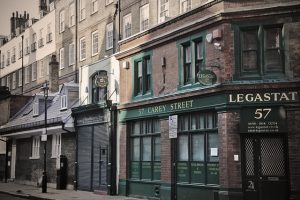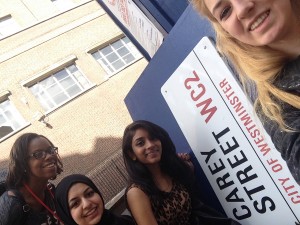From fiction to reality
All of our first year law undergrads took part in an exercise in week one of their LLB where they escaped City and went to visit a number of buildings of significance in the local area, before tackling some research questions.
They were then asked to write a blog post inspired by their travels. 21 winners were selected from all those posts submitted – this is one of those – thanks to Tatiana Ghislotti.

Credit: kotomi_ via flickr
“It was a foggy day in London, and the fog was heavy and dark.”
The opening scene of the third chapter “Lodgers in Queer Street” of “Our Mutual Friend”, by Charles Dickens (1864-65) sets the story of a corrupt moneylender plotting to bankrupt his “friends” because they outshine him socially.
From the mid-nineteenth century “going on Carey Street/Queer Street” had come to mean broke, insolvent, penurious and heading for bankruptcy.
This meaning comes down to the fact that the Bankruptcy Court was established on Carey Street in London in the early 1840s. I never actually thought one day I could walk in the same street, for me the day was sunny indeed but I could still feel the darkness of its past. Before 1869 with the Debtors Act which abolished Imprisonment for Debt, going on Carey Street used to be a source of shame that could also involve conviction. The same Charles Dickens had a taste of this stigma when his own father was imprisoned as punishment for fraudulent debt.
Walking in Carey Street made me think about the difference that being bankrupt had back in the time compared to nowadays. Sometimes we hear stories of people being “forced into bankruptcy”, we read about businessmen that are overwhelmed with debts and end their lives with the beliefs that death will end their problems.
Sometimes we hear a different type of story, we read about people that are not struggling, people that see that bankruptcy is an easy way out of their financial crisis. Being bankrupt is a legal status that can clear debts you can’t pay, logically is the easiest solution for whom had personal and financial issues but there are still people who are living the high life filled with excess and luxury goods that see no shame in filing the petition when they realise they have lost control over their finances. These people are most likely to blame society for leading them into a life of excess and consumerism and blame banks that have a ruthless system to force people into bankruptcy. The truth is that most of the people that file the petition are taking advantage of this legal status to find an easy way out of their problems.
Studying law I sometimes wonder why people are always taking shortcuts instead of dealing with their problems. When people file for bankruptcy in this manner they hold little accountability for their actions and often do not consider the impact their actions has on others. The choice of file a petition to bankruptcy has also to consider the position of the creditor, who in good faith gave goods and funds and suddenly would see his business having an economic loss caused by the debtor. The impact would may not just damage the business but could also compromise employees.
Filing bankruptcy has serious consequences which include increased difficulty in securing loans, apartments, cars, insurance and almost anything involving a credit check but yet indeed we have people considering bankruptcy as a gift. Paul Broderick is an example of it, the author of Bankrupt Diaries a novel he wrote in 2011, who claims that filing for bankruptcy was the best thing he could possibly do and gave him a “fresh start”.
From Carey Street the stigma of shame we passed to a new reality where people are helping others to find the best way to avoid facing their economic situation. In the past century not being able to pay debts was a dishonour for a man and as serious it could be, people were facing imprisonment as punishment while nowadays people vaunt how easy it is to get their debts written off. The morality of facing the consequences of our actions in this matter has changed during time. The legal system helps people that are forced into bankruptcy but also helps other kinds of people to correct their economic mistakes with an easy solution. In some ways the current law is giving the option of not taking responsibility and not facing real consequences.
Visiting Carey Street gave me inspiration for a critical approach about the matter which led me to wondering, if the punishment was still severe enough and could lead into serious conviction, would people still file the petition for bankruptcy?


